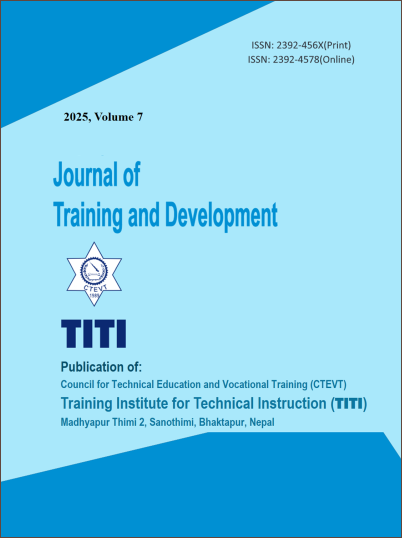Enhancing Rural Women's Technical and Vocational Capability through Homestay Initiatives in Nepal
An Ethnographic Exploration
DOI:
https://doi.org/10.3126/jtd.v7i1.74972Keywords:
community homestay, enterprise, rural women, technical and technological education, vocationalAbstract
'Homestay tourism' occupies significant space in Nepal's tourism sector, and these homestays are mostly operated by women, who are often informally educated and have less access to modern skills and knowledge-gaining opportunities. However, limited information is available on rural women's experiences in such endeavors. This paper elaborates the experiences of rural women who received various types of technical and vocational training in the process of developing and managing community homestays in rural areas of Nepal. The study was carried out using qualitative approach (ethnography) in the Mahabharat Hills of Bagmati Province administering various qualitative tools, such as participant observations, 'bhalakusari' (intimate informal talks/'kurakani'), focus group discussions (FGDs), and study of local artifacts. A total of seven homestay operators (women) were engaged in the close observations and 'bhalakusari'. Additional reflections were also gathered from other stakeholders: the family members, tourists, local leaders, as well as the community facilitators. The findings suggest that homestay tourism in the area has been playing significant role in the process of transferring technical knowledge and vocational skills to these rural women, so that they are inspired and motivated to engage in the homestay enterprising with better confidence. The study also concludes that homestay operators' limited educational and literacy skills, and less exposures have put difficulties in the learning and capacity development processes. Suitable training courses with local and/or simple Nepali language, along with adequate reading/ supporting materials and continued facilitation and backstopping are some of the practical implications suggested by the study.
Downloads
Downloads
Published
How to Cite
Issue
Section
License

This work is licensed under a Creative Commons Attribution 4.0 International License.
Authors who publish with this journal agree to the following terms:
- Authors retain copyright and grant the journal right of first publication with the work simultaneously licensed under a Creative Commons Attribution License that allows others to share the work with an acknowledgement of the work's authorship and initial publication in this journal.
- Authors are able to enter into separate, additional contractual arrangements for the non-exclusive distribution of the journal's published version of the work (e.g., post it to an institutional repository or publish it in a book), with an acknowledgement of its initial publication in this journal.
- Authors are permitted and encouraged to post their work online (e.g., in institutional repositories or on their website) prior to and during the submission process, as it can lead to productive exchanges, as well as earlier and greater citation of published work (See The Effect of Open Access).




